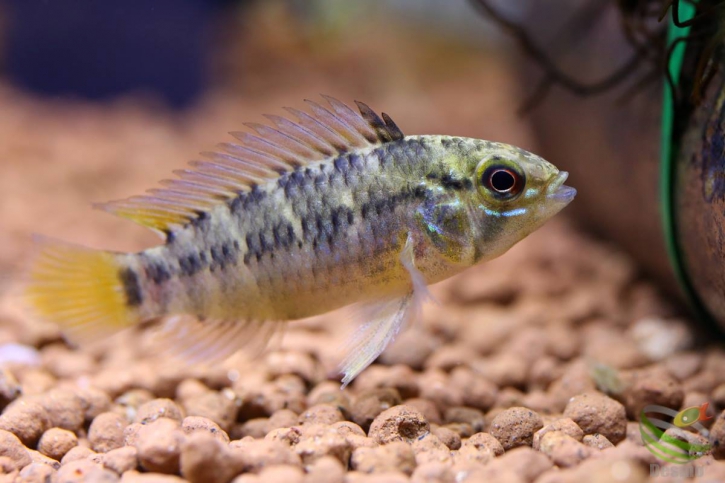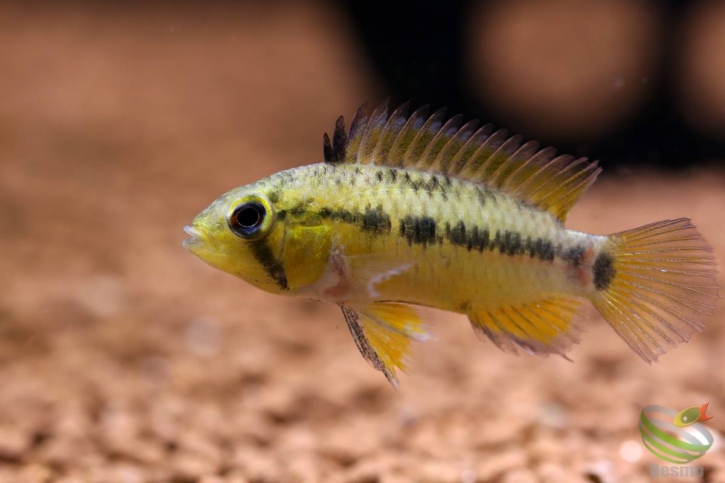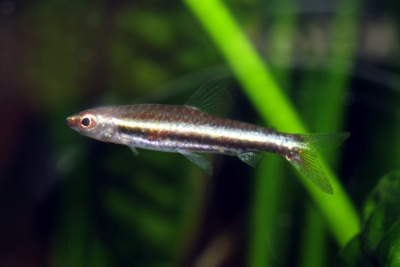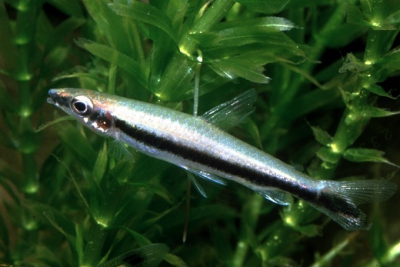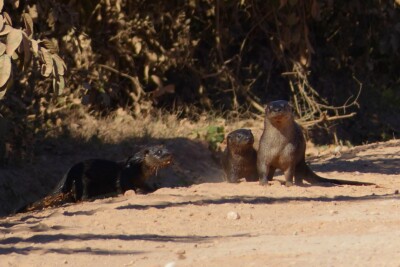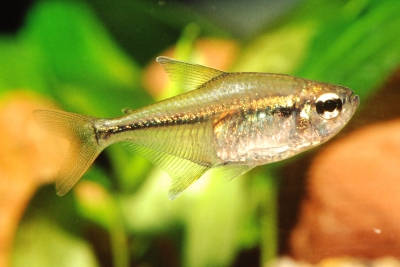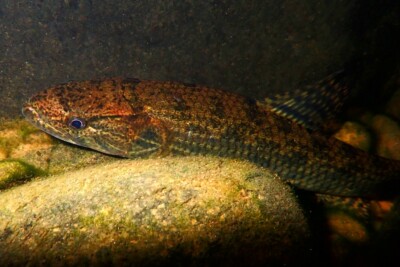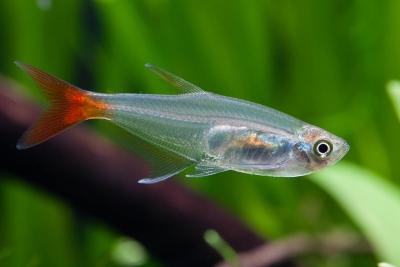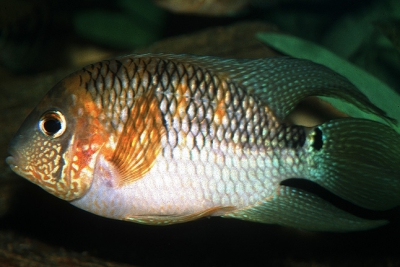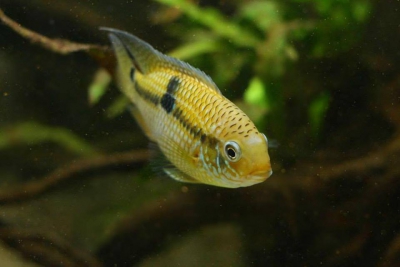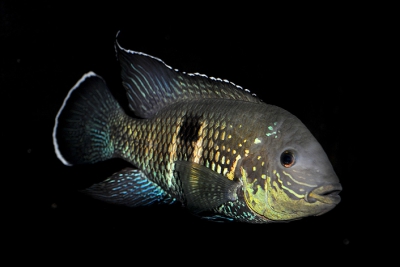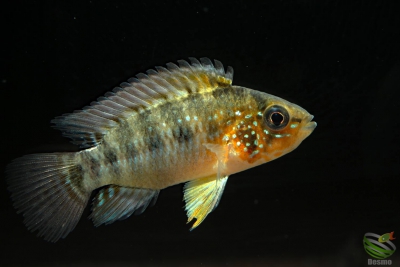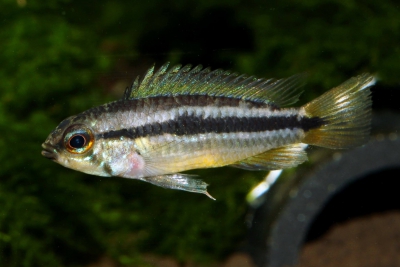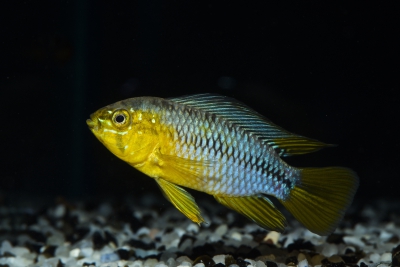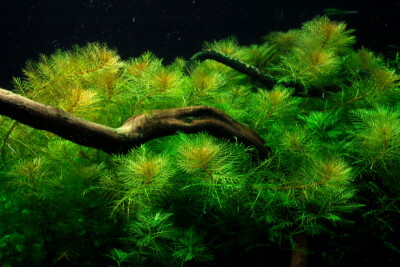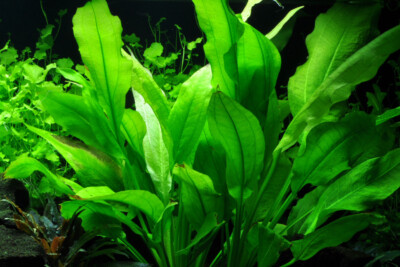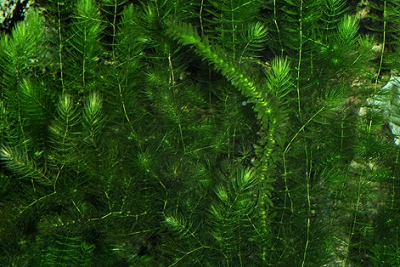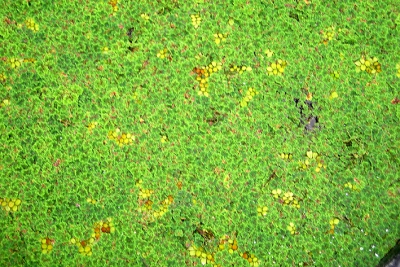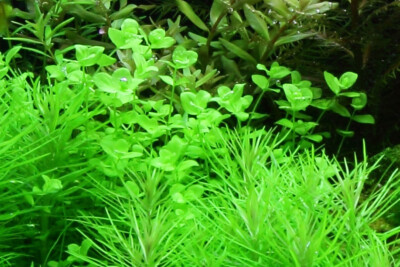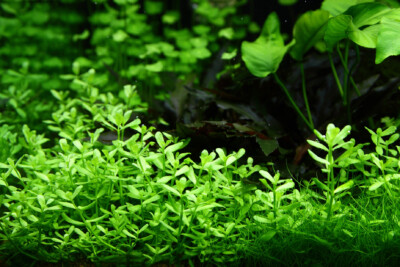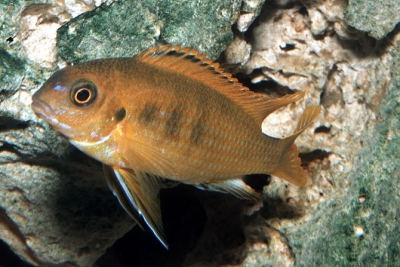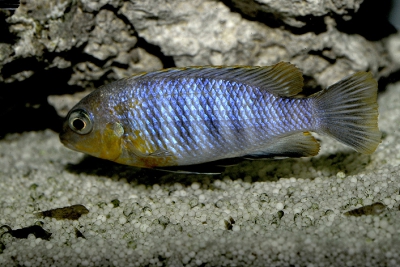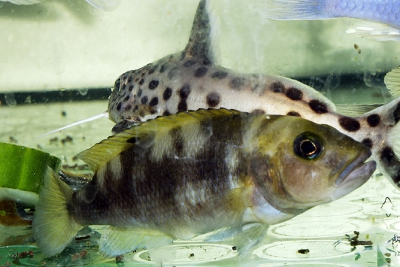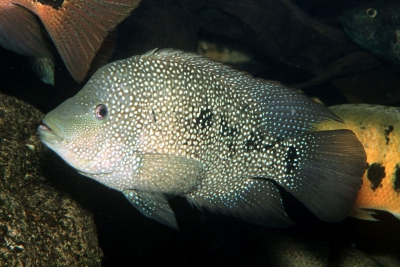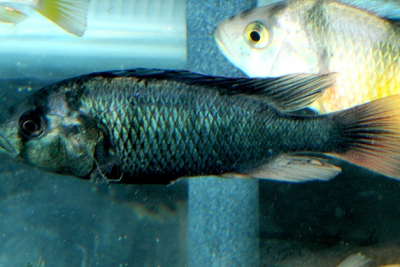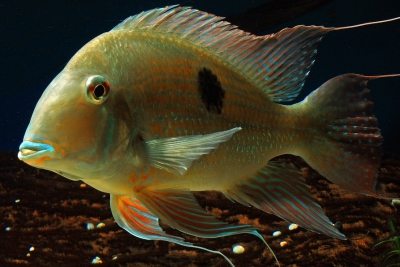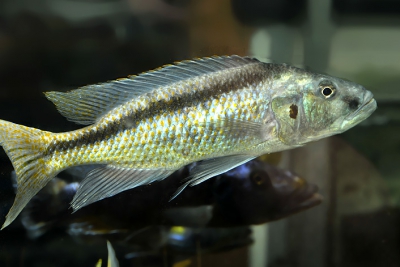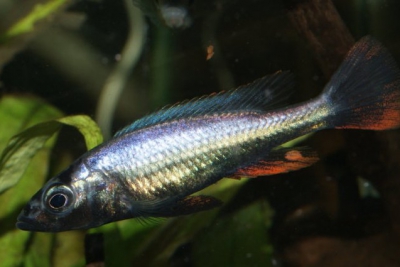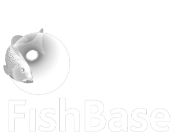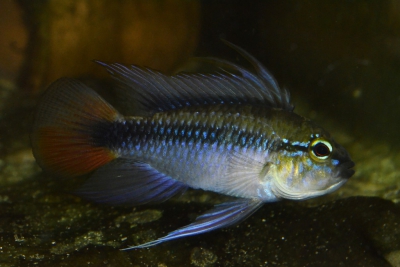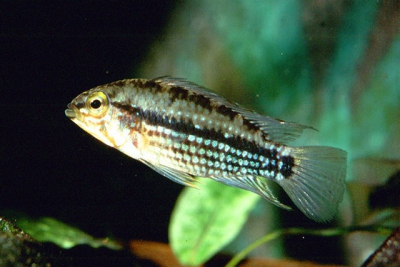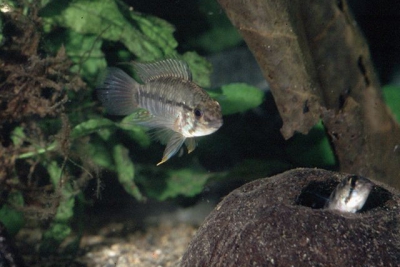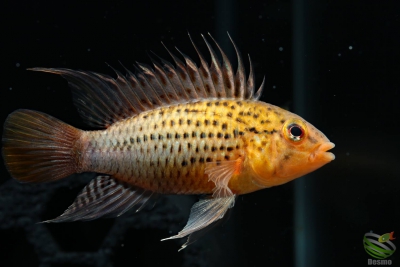Apistogramma pedunculata
| Scientific name | Apistogramma pedunculata |
|---|---|
| Descriptor | Mesa S. & Lasso |
| Year of description | 2011 |
| IUCN category (World) | NT |
| Family | Cichlidae |
| Genus | Apistogramma |
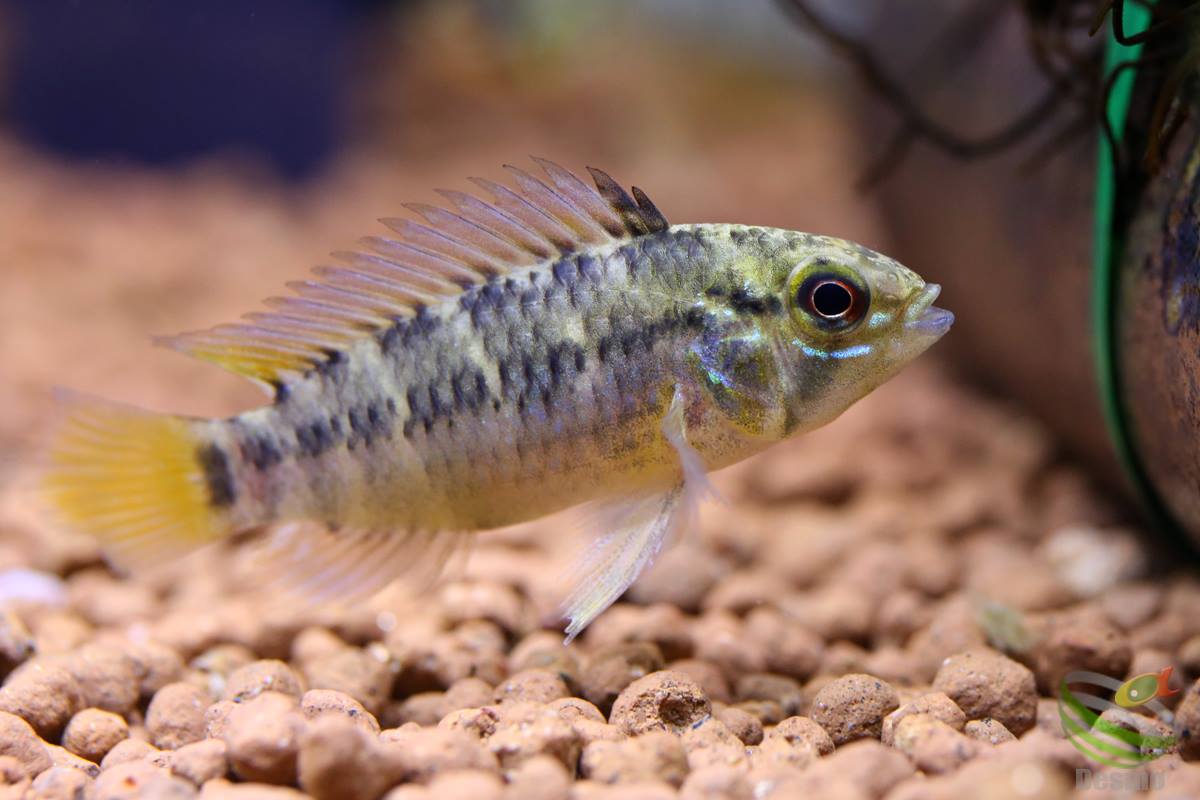

Introduction
Apistogramma pedunculata is a little fresh water fish from the Amérique du Sud.
This sheet is currently being prepared. The texts currently proposed come from our data model or are being drafted. To request priority for this content, you can write to us HERE.
Who is it?
Genus Apistogramma
In 2019 according to Fishbase, 89 species belong to genus Apistogramma. Fishes of this genus all belong to the „dwarf cichlids“ family. As a reminder, cichlids are one of the main freshwater families. Most of the Apistogramma fishes measure less than 10 cm, which is why they have been attributed the adjective „dwarf“.
Into the wild, these fishes can be found in almost the entire neotropical realm, east of the Andes, with a high concentration in the Amazon Basin. Most of them live in highly localized and isolated areas, in drainage systems of lowlands tropical rainforests and in open savannas around the Amazone, Orinoco and Paraguay rivers areas. Some species are widespread such as A.agassizii, A. bitaeniata, A. cacatuoides or A. trifasciata.
Other species with a narrow geographic distribution are particularly threatened by rapid environmental changes and could be affected by forest degradation or dam construction.
Apistogramma fishes generally inhabit edges of streams or rivers, in waters of shallow depth and with leaf litter on the bottom. They can be found in all kinds of waters (clear waters, dark waters, white water streams). These territorial small fishes take good care of their offsprings. Sociability varies from one species to the other.
In these characteristic environments, they swim along various species of tetras, pencil fishes, Corydoras fishes and Loricariidae. Others cichlids also inhabit this kind of habitat.
It is clear that some species have not been described to date. Researches are ongoing in order to further refine information on this genus. Three main subgroups of Apistogramma fishes have been identified: the steindachneri, the agassizii and the regani lineages. Despite strong similarities between certain species, hybridization risks are very low. Wild females are very picky and a study shows that they recognize males from a same territory and will choose them in order to reproduce.
This genus is considered as the sister clade of the Taeniacara genus.
Morphology
-
Type
-
Average size4 cm
-
Maximum size5 cm
-
ShapeOval
-
Type
-
Average size4 cm
-
Maximum size5 cm
-
ShapeOval
How to recognize This fish ?
Apistogramma pedunculata measures between 4 and 5 cm. Given its small size, this species is commonly referred to as a "dwarf" animal. This fish is unicolore with a predominantly beige body.
Behaviour & Life cycle
-
dietomnivorous
-
Sociabilityliving in small groups
-
territorialYes
-
Way of livingdiurnal
Apistogramma pedunculata is a fish living in small groups naturally found near the bottom. The members of each group are organized around a well established hierarchy. This species is omnivorous . Measuring only a few centimeters, this small species tends to be discreet and hide in the presence of larger neighbors.
This species is territorial and does not appreciate the presence of intruders nearby, especially animals with similar behavior. It can also be virulent toward conspecifics. However, Apistogramma pedunculata has little concern for non-territorial animals.
Reproduction
-
Reproductionovipare qui pond sur substrat découvert
Apistogramma pedunculata is a fish ovipare qui pond sur substrat découvert.
Harmless species
This species does not represent any particular threats to humans when encountered in its natural environment.
Origin and distribution
Conservation status of populations (IUCN)
What is its habitat?
Natural environment characteristics
-
Temperature24 - 28 °C
-
pH (acidity)5 - 6.5
-
FlowSlow
Biotope presentation
The acidification of water comes from the decomposition of plants. This phenomenon changes the color of the water, which tends to turn brown. In some areas particularly rich in organic matter, the water is so dark that it is called "black water".
Species of the same biotope
Main recommendations for fishkeeping
Deontology
In order to preserve wildlife, if you acquire this animal, it must not be released into the wild. See also, the Fishipedia charter.
Fishipedia supports the practice of responsible and environmentally friendly aquarium keeping. We encourage maintenance if it is motivated by a desire to understand the biological functioning of living things and if it is done with respect for animal life.
We believe that aquaristics is an opening to the discovery of aquatic environments, especially freshwater, and that this knowledge is necessary to better protect and respect these environments. Logically, we refute the compulsive purchase of animals that would not find a sufficient and / or adapted place in the host aquarium.
Our recommendationsThese tips apply to adult species from breeding. With regards to water conditions, wild species or close relatives must be kept under the same conditions as in their area of origin.
-
Min volume80 liters
-
Population min2
-
Temperature24 - 28 °C
-
pH (acidity)5 - 6.5
CharacteristicsThe characteristics below apply for adult species. They correspond to an average of cases, validated in maintenance condition.
-
Difficulty breedingThe farming difficulty is relative. It depends on experiments already carried out with similar species. First, it takes into consideration the robustness of the species, the ease of recreation of a favorable environment and the general behaviour with the other inhabitants of the aquarium.unknown
-
Robustnesstolerant
-
Behaviourslightly aggressive
-
Availabilityrare
Recommended equipment from our partners
-
Aquarium
-
Filtration
General reminders
It is strongly advised to read the complete dedicated file and to get information on the feedbacks of maintenance of the envisaged animal, this to avoid any potential conflict whose end result is generally the death of the individual (or the other inhabitants). It is important not to overload your aquarium to limit pollution. This will make maintenance easier.
In nature, animals are subject to weather conditions and live in waters with variable characteristics. The recommendations offered by our team for aquarium maintenance are a guidance and cannot be assimilated to scientific datas.
General reminder on maintenance datas
Le démarrage d'un aquarium est une partie primordiale pour l'équilibre et le bien-être des poissons. Lorsque l'on met en eau un aquarium, l'eau passe naturellement par un cycle biologique : le cycle de l'azote. Celui-ci dure environ trois semaines. Tous les 2 jours, nous vous conseillons de tester votre eau jusqu'à ce que le taux de nitrite soit à zéro pendant plusieurs jours d'affilée.
Pour accélérer ce cycle, vous pouvez utiliser un activateur de bactéries comme JBL Denitrol. Cette solution riche en bactéries vivantes et enzymes permet une mise en place rapide du cycle de l'azote. Les poissons peuvent alors être introduits plus rapidement.
Il est important de tester l'eau de son aquarium régulièrement pour maintenir un environnement sain pour les poissons et les autres habitants. Les tests d'eau permettent de mesurer les niveaux de différents paramètres tels que le pH, la dureté totale, ainsi que les taux de nitrates, de nitrites et d'ammoniaque.
Pour réaliser ces tests, vous pouvez utiliser des produits d'analyse spécialisés tels que JBL ProScan qui permet de réaliser un diagnostic de l'eau directement via un smartphone. Il existe également des coffrets de tests plus classiques de bandelettes, comme JBL PROAQUATEST.
En cas d’usage de l’eau du robinet, vous pouvez utiliser un conditionneur d’eau de type Biotopol de JBL pour éliminer les substances nocives comme le chlore, le cuivre, le plomb et le zinc. Les conditionneurs d'eau garantissent une meilleure santé aux poissons et une meilleure croissance des plantes.
Chlorine and chloramine are dangerous for the health of animals. Used to disinfect water, these agents are present in significant quantities in tap water. We recommend using an anti-chlorine agent every time you change the water. In addition to chlorine, treatments and medicines sold for aquarium use sometimes contain dangerous heavy metals in high doses.
Specific needs for Apistogramma pedunculata
Apistogramma pedunculata is a species which lives naturally at a temperature between 24 °C and 28 °C. For proper maintenance, the temperature should never exceed the 31°C for long periods. Nitrate levels should remain below 50mg/L. To keep the water clean and unpolluted, plan on changing 20% to 30% of the water volume each month.
This species is very rare in the aquarium trade. Instead, it is maintained by knowledgeable aquarists who own and breed individuals from wild origin strains. If you want to get this species, we advise you to contact specialized clubs. }Specimens from long time breeding are a bit easier to breed but you have to respect the particular water parameters.
Cohabitation & Environment
Being a living in small groups fish, it is advisable to install at least 2 individuals in an aquarium of 80 liters minimum. Group maintenance is a prerequisite to ensure their well-being. Lonely individuals tend to quickly become stressed and become especially susceptible to disease.
Apistogramma pedunculata may show signs of aggression. In general, this species should not be mixed with large territorial species or other overly aggressive species, in order to avoid possible stress or even injury.
However, it can coexist with other species with a peaceful temperament and with some slightly territorial neighbors, as far as the volume of the aquarium allows. It is important to avoid that two territorial species share the same living area in an aquarium of insufficient volume.
It should be noticed that this species should not be kept with large crustaceans or fish, as it would become a prey of choice. Smaller species should preferably be inserted in the aquarium some time before the larger ones. Moreover, if you want to breed it, it is better to put them in a specific aquarium.Acid Water Maintenance
Apistogramma pedunculata living naturally in acidic water, generally in "black" or "sieved" water, the implementation of a filtration on peat is ideal for its balance. Adding decaying leaves and alder fruit can significantly improve living conditions by naturally increasing acidity of some water.Tips for feeding
Apistogramma pedunculata is omnivorous.
This species can eat dry food (flakes, pellets), fresh food and frozen food. To avoid deficiencies, it is recommended to vary the types of food.
You should not overfeed your residents to avoid polluting the water. For most species, it is better to feed a few small portions each day rather than one large meal.
Food recommendations from our partner JBL - Products PRONOVO
-
Granules
-
Flakes
-
Sticks
Reproduction protocol
-
egg-laying protectionYes
Hybridization risks
In general, it is advised not to mix several species of the same genus or different varieties of the same species, to avoid the risks of hybridization.
These animals might interest you
These plants might interest you
Plants play a crucial role in aquariums, both for their ability to filter water by absorbing excess nutrients and for their aesthetic contribution. They provide fish with natural hiding places, can serve as breeding sites, and generally help maintain the overall balance and optimal conditions of the aquarium. The selection presented here includes species from the same regions as the species described on this page, although they do not necessarily come from its exact natural biotope.
To go further
Sources & Contributions
Participation & Validation
The Fishipedia team and specialist contributors are committed to providing high-quality content. However, although the information comes from scientific sources or testimonials from specialists, the cards may contain inaccuracies.

Benoit Chartrer
Translation
Translation done with the valuable contribution of our translators, who make this information available to a wider audience. We sincerely thank them for their commitment.
Scientific partners
Species of the same family
Same genus
Species of the same biotope
